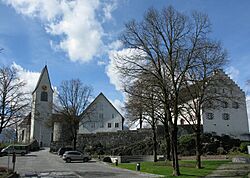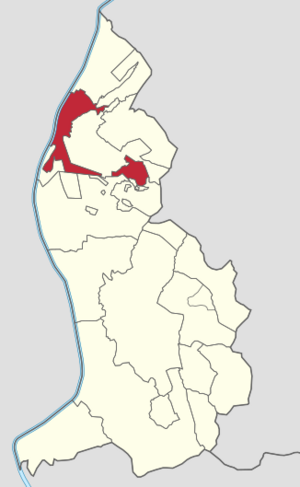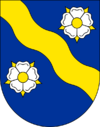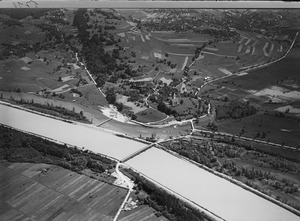Gamprin facts for kids
Quick facts for kids
Gamprin
|
|||
|---|---|---|---|
|
Municipality
|
|||

Bendern, with the parish church of Saint Maria
|
|||
|
|||
|
Location of Gamprin
|
|||

Gamprin and its exclave in Liechtenstein
|
|||
| Country | |||
| Electoral district | Unterland | ||
| Villages | Bendern | ||
| Area | |||
| • Total | 6.1 km2 (2.4 sq mi) | ||
| Elevation | 472 m (1,549 ft) | ||
| Population
(31-12-2019)
|
|||
| • Total | 1,690 | ||
| • Density | 273/km2 (622/sq mi) | ||
| Time zone | UTC+1 (CET) | ||
| • Summer (DST) | CEST | ||
| Postal code |
9487
|
||
| Area code(s) | 7009 | ||
| ISO 3166 code | LI-03 | ||
| Website | www.gamprin.li | ||
Gamprin (German pronunciation: [ɡamˈpʁiːn]) is a small and friendly municipality (like a town or district) in Liechtenstein, a tiny country in Europe. It's located right next to the Rhine River, which forms a border with Switzerland. In 2019, about 1,690 people lived there. Gamprin includes the village of Bendern and several smaller areas. It's also home to important places like the Liechtenstein Institute and LGT Group.
Contents
History of Gamprin
Ancient Settlements
People have lived in Gamprin for a very long time. Evidence shows that humans settled here during the Stone Age, Bronze Age, and Iron Age. An important archaeological site called Lutzengüetle is found within the area.
How Gamprin Got Its Name
The name Gamprin comes from an old language called Old Romansh. It means "field on the Rhine River." The area was first mentioned around the year 1150 as Camporin. Later, in 1253, it was called Gamperin.
Early Village Life
The main church in Gamprin, dedicated to Mother Mary, was built in 1481. However, there were earlier churches on the same spot, dating back to 1045. In 1499, the village was attacked by Swiss soldiers.
An old document from 1643 describes the rules for villagers. It explains their rights and duties for using local pastures and forests. In 1699, the people of the Lower Country (which includes Gamprin) promised their loyalty to the Prince of Liechtenstein at Bendern.
Crossing the Rhine River
For many years, from the 1700s to the 1800s, Bendern was one of five places in Liechtenstein where people could cross the Rhine River by ferry. These ferries connected Gamprin with Haag, a town now in Switzerland. A wooden bridge was finally built across the river in 1867-68, making travel much easier.
Geography of Gamprin
Gamprin covers an area of about 6.188 square kilometers. It is located in a hilly area west of Eschnerberg. The municipality includes the main villages of Gamprin and Bendern. It's also made up of several smaller, spread-out areas called hamlets, such as Au, Bühl, Badäl, Salums, and Gölla.
Borders and Neighbors
To the south, Gamprin shares borders with parts of Eschen, as well as Vaduz and Schaan. To the east, it borders the municipality of Eschen. To the north, you'll find Schellenberg and Ruggell. On the west side, the Rhine River forms the border with Sennwald in Switzerland.
Special Forest Areas
Gamprin also has a special separate piece of land called an "exclave." This exclave is a forest area of about 72.38 hectares on the western slope of the Dreischwestern mountain range. It's located above Nendeln and Schaanwald. Another forest area of 40.52 hectares belonging to Gamprin is found on the Eschnerberg.
Gampriner Seele: Liechtenstein's Only Lake
Gamprin is home to the Gampriner Seele, which is the only lake in all of Liechtenstein! It's about 2.6 hectares in size. This lake was created in 1927 during a big flood of the Rhine River. The powerful water caused a lot of erosion, which means it wore away the land, forming the lake.
Coat of Arms and Flag
Until 1950, the municipality of Gamprin did not have its own official coat of arms or flag. A special committee was formed to design them. The yellow ribbon on the coat of arms represents the Rhine River. The roses come from the coat of arms of a knight named "Rüdiger von Limbach," who lived in Gamprin during the Middle Ages. In 1958, Gamprin officially adopted its new flag and coat of arms.
Important Places in Gamprin
Gamprin is home to a few important institutions. These include the Liechtenstein Institute, which is a research and education center. The LGT Group, a large banking and asset management company, also has a presence here. You can also find a local winery in the municipality called Zaungässler Weine.
Notable People from Gamprin
Many interesting people have come from Gamprin or have strong connections to the municipality.
- Wilhelm Büchel (1873-1951), a farmer and politician who was a member of the Parliament of Liechtenstein.
- Wilhelm Näscher (1892-1948), another farmer and politician who served in the Parliament.
- Johann Georg Hasler (1898-1976), a farmer and politician who was also a member of Parliament.
- Ernst Büchel (1922-2003), a lawyer and politician who served in the Parliament of Liechtenstein.
- Armin Meier (1941-1999), a special education teacher and politician who was a Member of Parliament.
- Otmar Hasler (born 1953), a teacher and politician who became the head of the government of Liechtenstein.
- Tina Weirather (born 1989), a famous alpine skier.
- Matthias Kaiser (born 1991), a professional motor racing driver.
People Connected to Gamprin
- Georg Gstöhl (1925-1999), a teacher, organist, and conductor who worked in Gamprin and was a member of the Liechtenstein Parliament.
- Elfried Hasler (born 1965), a financial expert and politician who grew up in Gamprin and became a member of the Liechtenstein Parliament.
- Marina Nigg (born 1984), a ski racer who competed for the SV Gamprin sports club.
See also
 In Spanish: Municipio de Gamprin para niños
In Spanish: Municipio de Gamprin para niños
 | Delilah Pierce |
 | Gordon Parks |
 | Augusta Savage |
 | Charles Ethan Porter |



